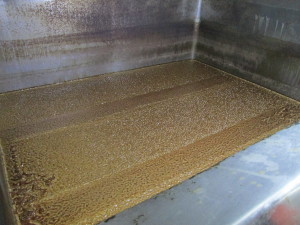 My March Beer 101 column heads down a bit of wistful path, as it came on the heels of a bout of contemplative reflection about brewing methods and brewing tradition. The column (which you can read here) anchors around Fuller’s Brewing, more specifically their centuries old practice of parti-gyle.I gently contrast Fuller’s use of parti-gyle to the more modern techniques developed today, from hopbacks and hop torpedos to scientific micro-biological precision.
My March Beer 101 column heads down a bit of wistful path, as it came on the heels of a bout of contemplative reflection about brewing methods and brewing tradition. The column (which you can read here) anchors around Fuller’s Brewing, more specifically their centuries old practice of parti-gyle.I gently contrast Fuller’s use of parti-gyle to the more modern techniques developed today, from hopbacks and hop torpedos to scientific micro-biological precision.
Parti-gyle is a process where multiple beer are produced from a single mashing (one grain bill). In Fuller’s case, they pull off two runnings and then post-boil create FOUR different beer by blending different portions of each. Their famous ESB and London Pride are part of that process (the middle two, to be precise).
There is no question that is pretty cool when you think of it. But that is my point, we rarely think of it these days. Our attention these days is caught by the shiny new things – hop torpedos, high-alpha hop varieties, innovative fermenter design, barrel-aging (which is and old thing re-purposed in new ways, but you get my point), etc. More generally we are attracted to beer that push boundaries and combine ingredients in new and innovative ways.
Which is all fair and good. But the question I ask in the column, and repeat, here is what would our response be if we were told AB-Inbev was making four beer from a single mash? I suspect the howls of outrage would send a dog scurrying under the bed. In actuality, the corporate brewers often make multiple
beer from a single batch – adding more or less water post boil to get regular and light versions of their beer (e.g., Bud Light is just Bud with more water).
Of course, you will be quick to point out, as you should, that Fuller’s has been making beer this way for centuries, and that makes it traditional and therefore acceptable. I agree. But what makes the AB-Inbev approach NOT acceptable?
I guess I just wonder if we have a bit of split personality in this regard. We applaud, and sometimes, drool over a new craft-y innovation, but tut-tut at the innovations of the big boys. Further, we tend to forget that there are still breweries using truly traditional methods. Both run the risk of idolizing modern craft brewers at the expense of other legitimate approaches.I think that tendency can over-state the importance of some kinds of innovation over others, and can discount the value of old-time methods.
I love that Fuller’s does parti-gyle (I occasionally do the same on my homebrewery). I love that Caledonian and others still use open Burton/Yorkshire Square fermenters. I love the new and innovative approaches, like constant hopping and such, as well. And if I am being totally honest with myself I also respect the innovations of the big boys, such as high gravity brewing. The end product may not be to my taste, but the process remains valid.
In the end, the column, and this post, didn’t really end up being a defence of tradition. I guess it is more a call for open-mindedness. Don’t lose sight of the old while embracing the new. And be careful which new you discard, as well. Today’s innovation might be tomorrow’s tradition.



Leave a Reply